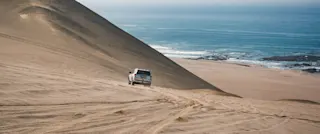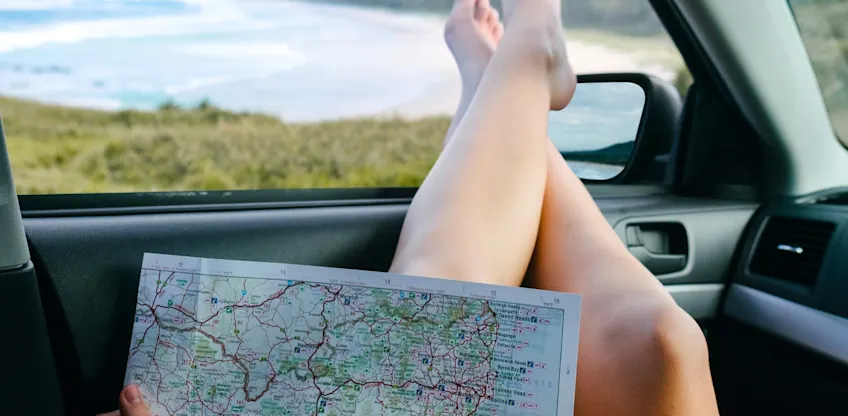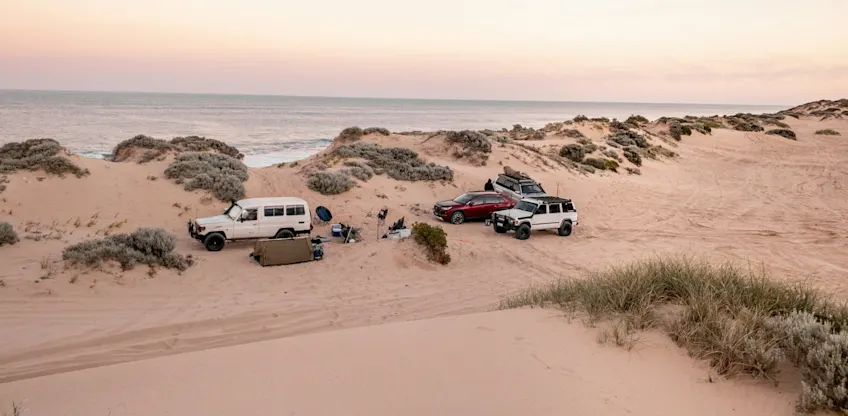
What’s the difference between torque and horsepower?
Torque vs. horsepower explained: Discover how these forces affect acceleration, towing, and top speed. Learn which matters most for your driving style at Carma.

Off-roading is one of Australia's most iconic pastimes, and for good reason. With an incredible range of landscapes to explore, there’s something for everybody. Whether you're hitting the road with friends in a Jeep, cramming the whole family into the Prado, or embarking on a solo adventure in your Jimny, we've crafted the ultimate guide to ensure a safe journey from start to finish.
When it comes to embarking on an off-roading adventure, it’s critical you choose the right vehicle for the job. With an array of options catering to different personal tastes, the key decision you'll face is whether to opt for a four-wheel drive (4WD) or an all-wheel drive (AWD) vehicle. What’s the difference? Simply put, AWD provides power to all four wheels at all times, while 4WD typically allows the driver to choose between two-wheel and four-wheel operation as needed for improved traction. Still confused? Learn more here.
For those serious about off-roading, we strongly recommend getting your hands on a 4WD. Built specifically to handle rough terrain (of which Australia has plenty), a 4WD offers better traction and higher clearance to get you up and over any obstacles that come your way. Vehicle modifications are another great option for those looking to increase their car’s off-roading performance. Popular upgrades include bull bars, snorkels, suspension enhancements and larger tyres which can dramatically improve a vehicle’s capabilities off the beaten track.
Before you set off, it’s important to ensure you have all the necessary gear to keep yourself and others safe whilst in a remote (and likely difficult access) environment. Remember, even the most experienced off-roaders can find themselves unexpectedly in trouble. There’s no such thing as being over-prepared, consider packing:
In addition to packing the essentials, it’s important to ensure that as the driver, you have the necessary skills to safely navigate difficult and unpredictable terrain. Inexperienced drivers risk rolling their vehicle, getting stuck, or breaking down, endangering both themselves and their passengers. If you’re new to four-wheel driving, we recommend shadowing a more experienced driver and taking it slow. Avoid venturing out alone until you become more familiar with your vehicle and its off-road handling.

It’s important to select the right off-road route based on your skill level and experience. Depending on your preferences, you can opt to tackle sandy beaches, rocky coastal areas, muddy forests or steep mountain country, all rewarding in their own unique way.
One element of planning that cannot be overlooked is ensuring you’re equipped with the navigational tools that will guide you once you’ve ‘gone bush’. Some of the most popular include:
Note: Due to many rural areas having limited phone reception, we recommend downloading your maps prior to departure to ensure you can still navigate whilst offline.

When it comes to off-roading, it’s all about packing the essentials and leaving the luxury items (like the air fryer) at home. Check out our go-to recommendations on what to bring:
Vehicle essentials:
Tyre punctures are an unfortunate fact of life when it comes to off-roading, but for those who come prepared, they're a relatively simple fix. Whether you choose to travel with one spare or two, having the tools to change or repair a tyre yourself means you can avoid the painful wait for roadside assistance, wherever you are. For those frequenting sandy tracks, it’s important to remember to deflate your tyres before the track becomes too soft. When returning to the bitumen, an air compressor and tyre pressure gauge are must-haves to get you aired back up and moving at full speed again.
Recovery gear:
Getting stuck is never fun, which is why it's crucial to have a well-stocked recovery kit packed when venturing off-road. Whilst getting bogged is a right of passage for all 4WDs, getting unbogged is the ultimate goal at the end of the day. Recovery tracks can help you regain traction in soft sand or slippery mud, and a winch can assist in pulling your vehicle out of the inevitable hole it dug for itself and towards freedom. And remember, if all else fails, you can always dig (assuming you remembered your trusty shovel).
Camping gear:
Don’t forget, it’s not just about what you pack, but how you pack. Make sure to load your car in such a way that essential items are up front or on top and that loose objects are tied down to avoid hitting passengers should things get bumpy.
A huge part of the appeal of off-roading is immersing yourself in the natural landscape. Practising ‘Leave No Trace’ promotes responsible off-roading and helps to preserve the natural environment for future visitors. Every time you venture into the outdoors, remember to:
By embracing these principles, off-roading can remain an enjoyable activity for everyone, now and in the future.
Ultimately, venturing into the world of off-roading demands more than just a sense of adventure; it requires thorough preparation and a commitment to responsible exploration. Embark on your next adventure with the knowledge that you’re prepared for whatever challenges may come your way. So, get the gang together, rev up those engines and gear up, it’s time to make some memories.

Torque vs. horsepower explained: Discover how these forces affect acceleration, towing, and top speed. Learn which matters most for your driving style at Carma.

Learn how to detail your exterior trim like a pro. From restoring faded plastic to UV protection, follow our DIY guide for a showroom finish.

Learn how Tyre Pressure Monitoring Systems work, the difference between direct and indirect sensors, and why they are vital for safety.